In the last two decades, Bangladesh has seen economic growth of over 6% and made good progress in reducing poverty and improving education.
But every day more than 320 newborn babies die, and women still have a 1 in 110 chance of dying during childbirth. Nearly 3 million women aged between 20 and 24 in Bangladesh gave birth before the age of 18.
ΒιΆΉΤΌΕΔ Media Action is tackling these worrying statistics with an integrated communications project called ΒιΆΉΤΌΕΔ Agomoni. It involves a TV drama, Ujan Ganger Naiya (Sailing Against the Tide), a discussion show, four ringtones, public service announcements, outreach activities including screenings of the drama in communities, and training for 900 front-line health workers, government officials and NGO workers who together will have an impact on 5 million households.
Ujan Ganger Naiya
First broadcast in May 2014, Ujan Ganger Naiya has now finished its third series which sought to tackle the issue of nutrition during pregnancy with its dramatic storylines that exploit the huge popularity of TV in Bangladesh.
The programme aims to improve knowledge about issues such as; the importance of regular antenatal check-ups, birth preparedness, safe delivery conditions, nutrition and essential newborn care β through entertaining the audience with dramatic stories set in a rural village. In series one, audiences saw the first ever birth scene portrayed on TV in Bangladesh.
The primary target audience of the project is women of reproductive age but the project also targets the mother-in-law, father-in-law and husband in each family, as well as health workers and those with influence in communities.
As part of the project, training for health workers has been rolled out across ten districts. Training aims to improve their communication skills so they can advise and support households in how to prepare for the arrival of a baby.
Research-led work
As with all of ΒιΆΉΤΌΕΔ Media Action's work, the project is shaped by formative research. Conducted in 2012, the research identified specific barriers and traditional practices across different geographies and communities in Bangladesh. Lack of knowledge and critical awareness about antenatal care, postnatal care and essential newborn care were identified as the main barriers to women receiving health checks during pregnancy and after delivery. A pregnant woman from a poor, rural community told our researchers, "I have no idea about check-ups during pregnancy and I have never gone anywhere for a medical check-up."
The belief that giving birth is βimpureβ was also reported to our researchers. One very poor mother said, βThe blood, placenta and pani-muchi (broken waters) that come out during delivery are impure in the same way as menstruation blood. So we use an old or ragged mat and plastic sheet for the mother. So, it does not need to be clean".
Project information
| Project name | ΒιΆΉΤΌΕΔ Agomoni |
| Funder | and the |
| Dates | 2011-2016 |
| Theme | Health |
| Outputs |
TV drama Ujan Ganger Naiya (Sailing Against the Tide), discussion show Natoker Pore (After the Drama), Public Service Announcements, ringtones and a community toolkit for NGO and health workers. |
| Broadcast partners |
ATN Bangla |
